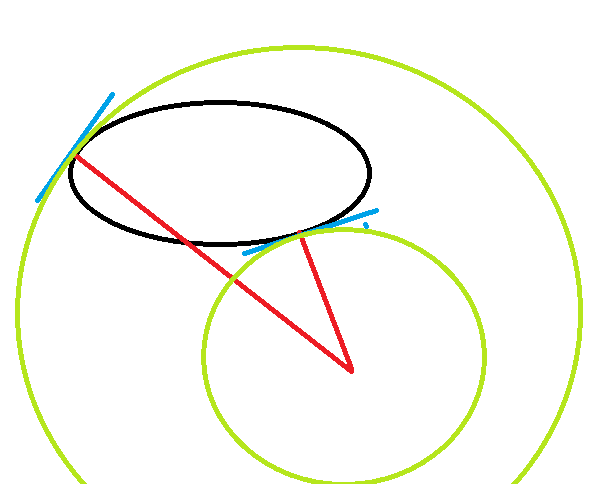General Systems Polynomial Equations
General Systems Polynomial Equations
We want to find a solution to the general problem of systems of polynomial equations. (There is a simple algorithm to solve these problems but maybe a neater way can be found?)
Firstly all systems of polynomial equations can be written in the following form:
∪i=1..n{XTAiX = 0}
with X a vector, A a matrix with X0=1. The solutions should all be written in terms of determinants {Ai+..}. Or using the antisymmetric tensor.
det(Q) = {Q}
One equation - n variables
For one equation a solution exists if:
{Q} > 0
This can be written in terms of traces.One variable: 2{Q} = [Q]2-[Q2]
Two variables: 6{Q} = [Q]3-3[Q][Q2]+2[Q3]
etc.
The general formula from traces comes from it's expression as a determinant.
QQQ...εε
Two Equations
Two equations - One(n?) Variable(s)A solution exists (common root) if (each has a solution as above):
([Q]2-[Q2])([R]2-[R2]) - ([Q][R]- [QR])2 = 0
4{Q}{R} - ( {Q+R}-{Q}-{R} )2 = 0
4 det(Q) det(R) - (det(Q+R)-det(Q)-det(R))2 = 0 ??
4 det(Q) det(R) - (det(Q+R)-det(Q)-det(R))2 = 0 ??
(and condition they are not imaginary roots??)
Can this be written in terms of {Q}, {R} and {Q-R}?
2{Q} = [Q]2-[Q2]
2{R} = [R]2-[R2]
{Q-R} = [Q-R]2-[(Q-R)2] = ([Q]2-[Q2]) + ([R]2-[R2]) + 2([QR]-[Q][R])
{Q+R} = [Q+R]2-[(Q+R)2] = ([Q]2-[Q2]) + ([R]2-[R2]) + 2([Q][R]-[QR])
{Q-R} - {Q}-{R} = 2([QR]-[Q][R])
{Q+R} - {Q}-{R} = -2([QR]-[Q][R])
Two equations - Two Variables
(This is the intersection of ellipses)
(A 12D polynomial!) Can this be made from traces? e.g. [Q12]+[R]12 ?
??? 4{Q}{R} - ( {Q-R}-{Q}-{R} )( {Q+R}-{Q}-{R} ) = 0 (6D polynomial)
Two equations - Three Variables
Is there a general formula made from traces?
Three Equations
Three equations - One Variable
They ALL share a common root if the determinant of the three equations is zero. (Can't write this in trace notation!!! in terms of Q, R & S ??)
= A11iA12jA22kεijk A=(Q,R,S)
Try{Q+R+S}
ε=((0,1),(-1,0)) (Doesn't generalise to more variables). (det(Q)=[QεQε]
[εQRS]+[εRSQ]+[εQRS]
N equations
N equations - One VariableIf any equation has a triple with all the others then there MUST be a common solution! So only need to test for triples using above determinant
N equations - Two Variables
N equations - N Variables
The maximal case


Comments
Post a Comment